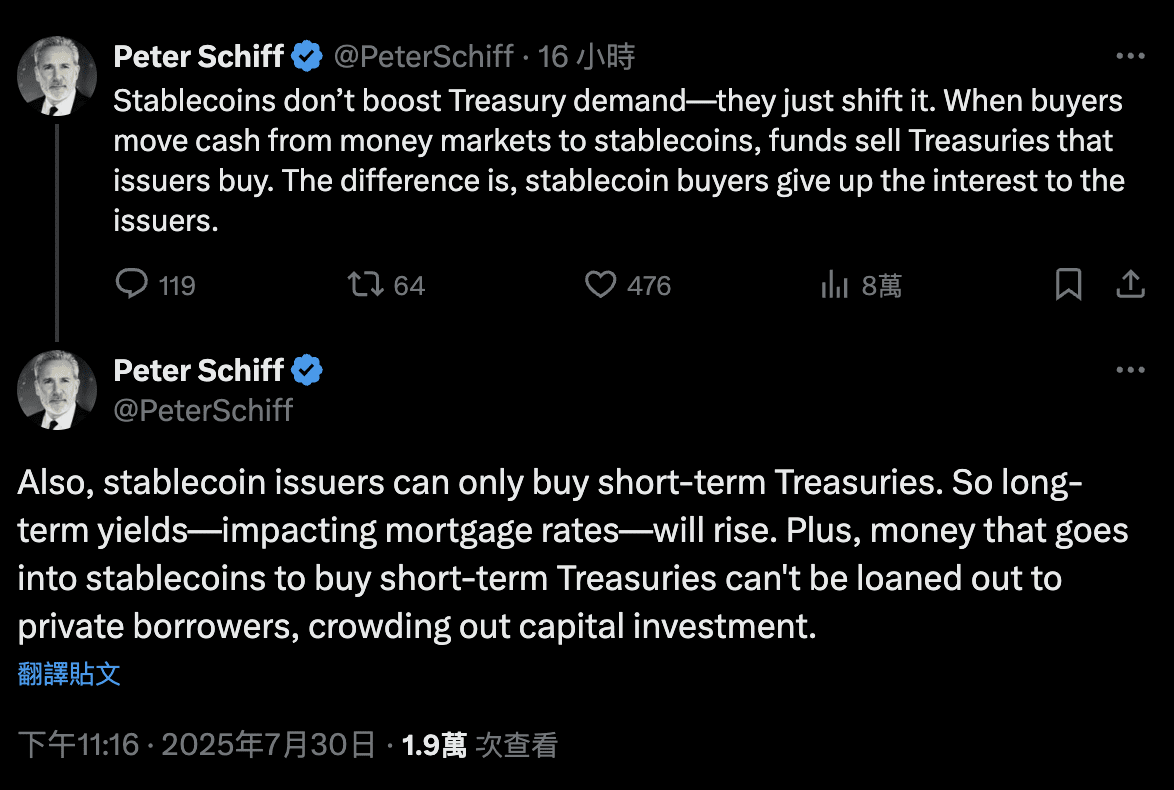Schiff challenges mainstream views, warning that stablecoins could push up mortgage costs.
Well-known economist and gold advocate Peter Schiff recently expressed strong skepticism about the common market belief that stablecoins could boost U.S. treasury demand. He warned on social media platform X that stablecoins do not increase treasury liquidity as commonly thought; rather, they may crowd out the traditional lending market, thereby pushing up mortgage rates, posing a broader threat to financial markets.
 Source: X/@PeterSchiff Peter Schiff believes that stablecoins do not increase treasury liquidity as the outside world thinks; instead, they may crowd out the traditional lending market, thereby pushing up mortgage rates.
Source: X/@PeterSchiff Peter Schiff believes that stablecoins do not increase treasury liquidity as the outside world thinks; instead, they may crowd out the traditional lending market, thereby pushing up mortgage rates.
Schiff explained that when investors move funds from traditional money market accounts to stablecoins, the underlying cash is merely redirected rather than truly added to the treasury ecosystem. He pointed out that the treasuries purchased by stablecoin issuers would have been bought by money market funds anyway; the key difference is that stablecoin buyers actually cede the interest income from those treasuries to the issuing company instead of directly receiving the income.
This long-term bearish economist on cryptocurrencies further elaborated that stablecoin issuers are limited to purchasing only short-term treasury instruments, which could lead to a decline in demand for long-term bonds. He emphasized that demand for long-term bonds is crucial in determining mortgage rates, and a decrease in demand would push up long-term yields, potentially increasing borrowing costs for homebuyers and businesses.
The crowding-out effect is emerging, which may impact investments in the real economy.
Schiff's concerns about stablecoins extend beyond structural changes in the treasury market to potential impacts on the real economy. He warned: 'The funds flowing into stablecoins to purchase short-term treasuries cannot be lent to private borrowers.' This means that there could be a reduction in capital available for productive investment, negatively affecting economic growth.
The argument regarding this crowding-out effect highlights the unexpected consequences that rapid growth in stablecoins might bring. As large amounts of capital flow into the stablecoin market, the lending capacity of traditional banking systems may be restricted, affecting the availability of financing for small and medium-sized enterprises and personal loans. Schiff believes that this reallocation of funds could have a negative impact on overall economic activity, especially in industries that require long-term capital investment.
Schiff's views stand in stark contrast to those of BlackRock, the world's largest asset management company. BlackRock recently stated that stablecoins are one of the important forces shaping the future returns of financial markets. This divergence reflects different interpretations of the role and impact of stablecoins in the market, highlighting significant differences of opinion among experts in this rapidly evolving industry.
Regulatory concerns are intensifying, as Trump signs the first major cryptocurrency legislation.
Peter Schiff's questioning comes at a time when the global use of stablecoins is surging, particularly as institutional investors and fintech platforms adopt stablecoins in large quantities to gain efficient exposure to the dollar. Many industry participants praise the liquidity and transparency advantages of stablecoins, but opponents like Schiff point out that these digital assets could undermine the stability of traditional financial markets.
As stablecoins play an increasingly important role in the financial system, regulators and lawmakers are continuously examining their impact. This issue became more significant after U.S. President Trump signed the (GENIUS Act), which is regarded as the first major cryptocurrency legislation in the U.S., establishing an initial framework for stablecoin regulation.
The divergent views on the prospects of stablecoins reflect the complexity of this emerging market. Supporters emphasize that stablecoins can provide more efficient payment solutions and a new avenue for the internationalization of the dollar, while critics like Schiff are concerned about the unexpected impacts they may have on the traditional financial system.
As the market size of stablecoins continues to expand, the debate over their actual economic impact is expected to intensify, and regulators will face the challenge of balancing innovation with maintaining financial stability.
This content was generated by Crypto Agent aggregating various information, reviewed and edited by (Crypto City). It is still in the training phase and may contain logical biases or information errors. The content is for reference only and should not be considered as investment advice.
'Headwinds Against the Stablecoin Boom! Peter Schiff: They Are Not the Savior of U.S. Treasuries, and May Push Up Mortgage Rates' was first published in 'Crypto City'.

